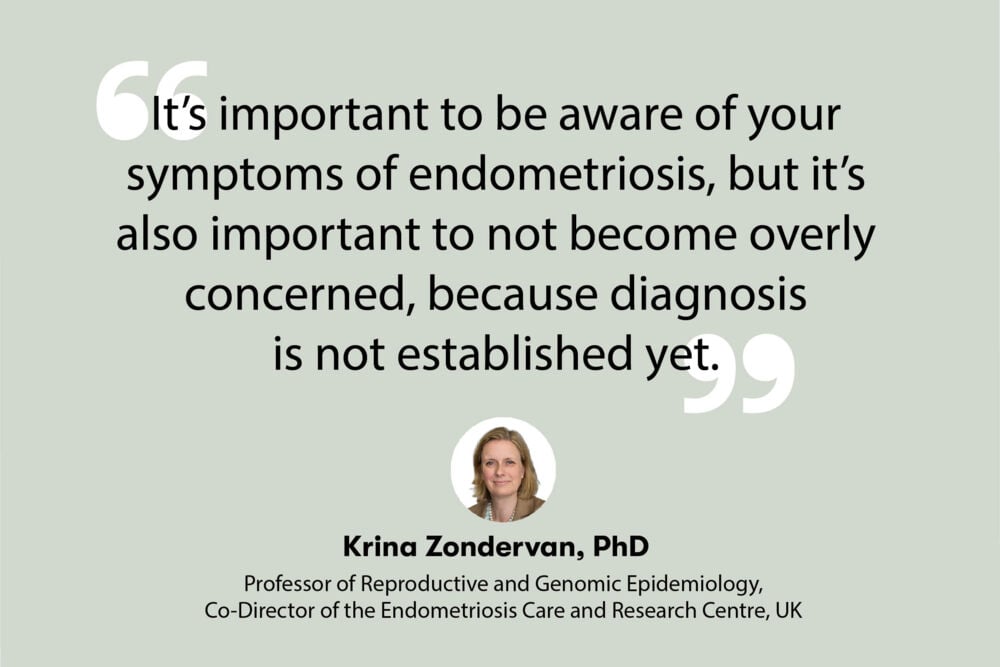Pain management is usually a bit of a case of trial and error. What works for some does not necessarily work for others. Dr. Krina Zondervan, professor of reproductive and genomic epidemiology, tells Flo readers about possible endometriosis pain relief methods and pain management.
-
Tracking cycle
-
Getting pregnant
-
Pregnancy
-
Help Center
-
Flo for Partners
-
Anonymous Mode
-
Flo app reviews
-
Flo Premium New
-
Secret Chats New
-
Symptom Checker New
-
Your cycle
-
Health 360°
-
Getting pregnant
-
Pregnancy
-
Being a mom
-
LGBTQ+
-
Quizzes
-
Ovulation calculator
-
hCG calculator
-
Pregnancy test calculator
-
Menstrual cycle calculator
-
Period calculator
-
Implantation calculator
-
Pregnancy weeks to months calculator
-
Pregnancy due date calculator
-
IVF and FET due date calculator
-
Due date calculator by ultrasound
-
Medical Affairs
-
Science & Research
-
Pass It On Project New
-
Privacy Portal
-
Press Center
-
Flo Accuracy
-
Careers
-
Contact Us
Endometriosis Pain Management: What Are the Options?


Every piece of content at Flo Health adheres to the highest editorial standards for language, style, and medical accuracy. To learn what we do to deliver the best health and lifestyle insights to you, check out our content review principles.
Interview has been edited for clarity.
How to treat endometriosis pain
Dr. Zondervan says that first line endometriosis pain relief is typically NSAIDs (nonsteroidal anti-inflammatory drugs), which are over-the-counter drugs like ibuprofen and aspirin. And for some people, those types of drugs do work to a certain extent.
Some people use hormones to treat their endometriosis. According to Dr. Zonderman, the aim of hormonal treatments for endometriosis is pain alleviation, and that first line of treatment is usually worth trying.
Dr. Zondervan adds, “You could also try to combat chronic pain through making changes in your lifestyle. You can try physical exercises to help with the pain. It is often helpful to talk to a pain specialist. And those people for whom pain medication and hormones do not really work could go to a medical center staffed with specialists who are really experienced in treating endometriosis.”
She says that the advice at these centers is often to bring in a pain specialist who can provide some options. Many people benefit from that.
Keeping an endometriosis pain and symptom diary
According to Dr. Zondervan, keeping a pain and symptom diary can be helpful for monitoring this condition for both the person with endometriosis and their health care provider. The same goes with logging symptoms daily in Flo.
“It is useful for your health care provider to know when you typically experience these symptoms,” says Dr. Zondervan.
“Obviously, if it is related to your periods, you will probably know. But if your symptoms happen to be, for example, around ovulation, which is a possibility, then it is often difficult to know exactly when that happens.”

Take a quiz
Find out what you can do with our Health Assistant
Additionally, being able to describe to your health care provider how regular your periods are and whether or not you’re having heavy bleeding is important, Dr. Zondervan says.
She also points out that the other side of that coin is that if you really monitor your symptoms very closely, you may start to become very aware of them as well. That might actually impact your life more as well. So there is a potential downside to keeping a journal.
“So, I would say, yes, it is important to be aware of your symptoms, but it’s also important to not become overly concerned, because diagnosis is not established yet. The journal is also a tool for you to help inform your physician.”


Hey, I'm Anique
I started using Flo app to track my period and ovulation because we wanted to have a baby.


The Flo app helped me learn about my body and spot ovulation signs during our conception journey.


I vividly
remember the day
that we switched
Flo into
Pregnancy Mode — it was
such a special
moment.
Real stories, real results
Learn how the Flo app became an amazing cheerleader for us on our conception journey.




